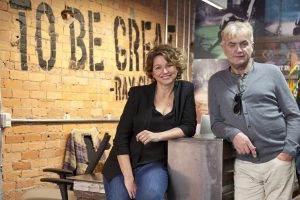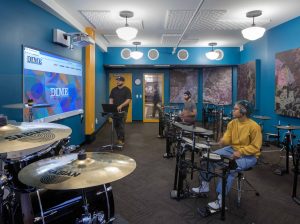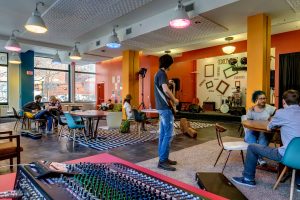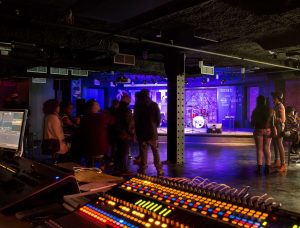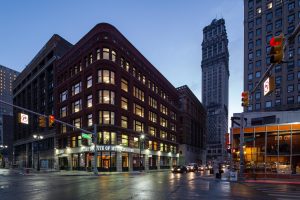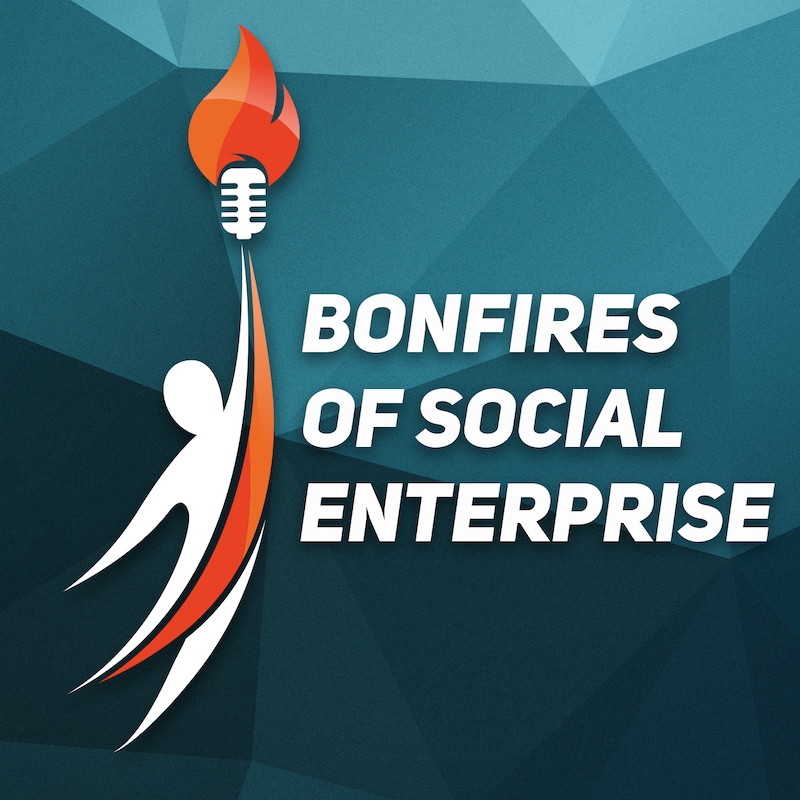
Shownotes
DIME Detroit
Time for another episode of the bonfires of social enterprise. Hear from the founders who took a chance, traded London for Detroit and began to engage with the young music talent of Detroit and then Denver. As usual, stay to the end and enjoy a full song from one of the student artists from DIME.
For the Full Transcript click below
Time for another episode of the bonfires of social enterprise. This is your host, Romy and I love our guests today! It is the Detroit Institute of Music Education that we abbreviate for DIME Detroit. We will hear from the founders who took a chance, traded London for Detroit and began to engage with the young music talent of Detroit and then Denver. As usual, stay to the end and enjoy a full song from one of the student artists from DIME.
Let’s check in with Natalie and see what she has for our fun fuel today.
Hello, I’m Natalie Hazen bringing you this episodes’ Fun Fuel.
Have you ever just drifted off listening to a song and let your mind wander and float with the melody? Great songs allow for just this to happen as our senses are taken on a journey with the Artist.
Notable musicians, scholars and presidents each have their own description of music.
William Shakespere said, “If music be the food of love, play on.”
Bono thinks, “Music can change the world because it can change people.”
Stevie Wonder eloquently stated, “Music, at its essence, is what gives us memories. And the longer a song has existed in our lives, the more memories we have of it.”
But I will leave you amazing listeners with one final quote from former United States President Ronald Reagan. He said, “Life is one grand, sweet song, so start the music.”
Thanks for listening, now on to our episode.
So….interesting! Natalie, you are so fun! Love it. Okay, let’s turn our ears to the interview with Kevin Nixon and Sarah Clayman of DIME Detroit. They begin by sharing some of their early success in England, their music label, and how they are empowering the kids of Detroit with music and production. Let’s drop in on the conversation now….
Romy: Okay, great well lets get started, let's talk about DIME, and do you go by DIME or DIME Detroit?
Sarah Clayman: DIME Detroit here, we have DIME Denver, and we also have DIME online where we have students studying in 22 countries around the world.
Romy: Yah okay so what is DIME?
Sarah Clayman: So we are a music institute, we teach guitar, bass, drums, vocals, songwriting, and music industry studies at bachelor degree level. We are very focused on getting young people into the music industry, and giving them the skills, and the academic credentials to be able to earn a full time living in the music industry. So we're about long-term sustainable careers in music.
Romy: Wow, that's powerful, so how did it start?
Sarah Clayman: Sure.
Kevin Nixon: Okay so it began back in England, we moved from England in 2014, prior to that we originally started in 2001. So Sarah, and I have had our whole lives in the music industry, and in the millennium year music went digital. And so that's when Napster came along, and the whole industry changed, and we were so brilliantly foresight that we thought we'd do something to help the next generation. Not really, we actually realized that there was a lot of change going on, and we kept, I kept getting phone calls regularly from people I'd come up through the industry with saying, "Do you know anybody who can do this job? And that job?" Some of these jobs were like really senior, like one of them was a managing director of Columbia Records in the U.K.
So we started to talk about this, and say what, "How come there is not another level of people coming up who are trained and being trained to take these jobs?" And we started doing some research, and the research within the industry was very easy for us because we were part of it. Well we went to a few universities and looked at their music departments, and low, and behold, no modern music, all classical, and all jazz. And so we actually thought, "Well let's do something about this, and we kind of built a rock, and roll school.
Sarah Clayman: Yah and you know we realize that unless you have a connection to the music industry how do young people get in the music industry?
You know it's such a closed shop, and we wanted to change that, we wanted to help young people understand that it wasn't about selling a million records, or ten million records like the Foo Fighters, or playing guitar in your bedroom. There are many, many great jobs, and career opportunities within the music industry that young people don't find out about. Like starting a merchandise company, being a tour manager, working in publishing, you know there's so, so many that you can earn a really good living, and still do what you love, which is music. And the music industry beats getting a proper job so.
Romy: Yes right. What was your background, what was your time in the music industry?
Sarah Clayman: Okay, so I actually grew up in the music industry, my fathers a concert promoter and a theater promoter. He's worked with artists like Michael Jackson, Barbara Streisand, Power Rangers, Prince, Julio Iglesias, Carpenters like forever.
Romy: Only those guys.
Sarah Clayman: But my dad was from a generation that didn't need education, so my dad left school at 13, he grew up in the East end of London. And just threw a series of coincidences met Gordon Mills, who managed Tom Jones, who's a big singer from whales, and he got into the music industry. And my dad is a brilliant mathematician, and he promotes concerts, so he's all about risk-taking, and making money, and understand the risks in deals.
So I grew up in that environment, and when I was 14 I said to my dad, "I want to be in the music industry," and he said, "No way it's not an industry for a women." So I said, "Well that makes you want to do it even more dad." So I started to just do some kind of internships with my dad in his office from the age of 13, 14, and then I went on the road, and I learned on tours, and production assistant, and things like that. And then I happened to meet the chairman of Sony music one day, and he offered me a job, so I worked with Sony music in the UK for four, and half years. And that's where I met Kev.
Romy: Yah so Kevin you were there, what's your background then?
Kevin Nixon: I was the manager's son; he's biggest UK act at the time, a band called, Kula Shaker, ew we got a feel of this up here. That's one of Sara's, there's loads around, but I was also from a music family, but I'm a musician, so my grandfather was a bandleader, and he was a jazz guitar player. Phenomenal jazz guitar player, there's many jazz guitar players, very few as good as him. And so all of his kids, my mom was the eldest, my mom is an expert on Sun Ra and composers. And then she's got five brothers, and they're all professional jazz musicians as well.
And I was the first of the next generation, so I got to learn from all my family, and we've all been brought up on the best music. So the first music I was exposed too was Django Reinhardt, Ella Fitzgerald, Count Basie, Duke Ellington. And I grew up with that until the Beatles exploded, and because I was the youngest, I became the one who loved all rock, and roll. And in our house, everybody went to work at 6 pm, and so I've only ever known about that really. My dad was a soccer player, and a professional soccer player so in our family you can either play music, or play soccer, and actually, we're all unemployable outside of that.
Romy: So you guys met and somehow came up with the idea when you saw the gaps it sounds like?
Sarah Clayman: Yah.
Romy: So did you start it right in London first?
Sarah Clayman: No, we started in a seaside town called Brighton on the south coast of England, and the reason we did that is because it is within 50 minutes of London. So we knew that the colleagues and friends we had in the music industry would be able to come visit the college and meet with the students. Because we realized quite early on that young people are super smart, and they started to learn from the Internet, and not just from being in a classroom. And we wanted young people to hear from professionals, and that was really the biggest thing, I think you can only learn so much from teachers. You really need to learn from people who are in the industry doing the work you know?
So bringing colleagues, and friends down from the music industry to talk about their experiences. What they were doing that week was really important to the thoughts of the company and what we were trying to do. But when we opened in Brighton we opened to 180 students in the first year, it grew to 360, 480, 720, and before we knew it within five years, we had 1000 students. Which took us completely by surprise because we only had a business plan to have a maximum of 300 students in Brighton. But we really kind of captured the imagination of young people, and we created an environment that didn't feel like a university, or a college, it felt like the music industry.
So young people felt very safe in our building and felt very supported through the creative process because music can be torturous as well. You know if you're a songwriter you're writing a lot about your personal feelings and your experiences. But then the other side of it was the parents really understood what we were doing because they had a guitarist kid who was slightly social awkward in their bedrooms. A mom and dad just scratching their heads going, "What am I going to do with johnny upstairs?" And we come along, and we can say well through what we've created here, not only can your child play what they love doing, which is guitar all day long, but they can also get academic skills, and credits for it. So mom and dad were really supportive, and that's why this thing just grew and grew, so.
Romy: And then how did you make the decision to jump over?
Kevin Nixon: So in our years, pre-music education, we both worked in the U.S. music industry as well as the UK, in fact in the international music industry. But I had an office in New York for a while, and I lived there in 94, actually Sara lived there in 94, we didn't know each other then. But I've been working it over here since about 79, and we obviously had a good understanding of the music business here, but it's actually quite different to the UK. And one of the problems with the UK is that there's only about 8000 people working it.
And we'd have 10,000 graduates after 10 years, so we started to get concerned that the business was getting too big for the jobs to study ratio. And so we thought, "Well we want to keep doing this, this is such a great rewarding thing to do," but we couldn't just keep going in the UK. So we decided to sell our UK business, and actually kinda used the money to come here, which meant that we've only got one investor, and he's a friend of ours. So it meant that we could keep control of the business, which is ...
Kevin: Sebastian, he's a friend of ours so it meant that we can keep control of the business, which is very important.
Romy: Yeah
Kevin: ... because once businesses get big, you know, everybody wants to have a piece of them. So we kind of went back to where we started, and it was a brave thing to do, and we were going to go to Brooklyn and start there, but we got invited to Detroit by a couple of people, one of which is Charlie who is our investor. He tried to get involved with us when we were in the U.K.
Romy: Oh okay.
Kevin: We had not worked out a deal, but he was like well come to Detroit you know and we also American Idol actually called us, and they wanted to partner with us too, but their short term-ism and our long term-ism was always going to be a bit of a clash.
We came here, and we met Charlie, and we took the brave step of saying no to Brooklyn and coming to Detroit.
Romy: Yeah we are so glad. So when was that?
Kevin: 2014.
Romy: 2014 okay. Just to repeat that so we are doing this interview in November of 2017. This really isn't even been five years.
Sarah: No, it feels like a startup still. We are still learning about Detroit. We are still finding things that we hadn't even thought of. You know it's a really special city. The musical talent here is incredible, but it's a forgotten city.
Romy: Yes.
Sarah: You know in terms of education and the young people come to us to study. They really low level and its hard work.
Romy: I am a music fan, but I'm not in it that it's a bit underground. You got to find where everybody is. Is a little bit of flushing out, who the talent is, kind of getting them to trust you to be a part of the [crosstalk 00:11:53]
Sarah: And when we first came to Detroit, we realized that Detroit is city that was built for 1.5 million people and there's only 700,000 people here, so everything is really spread. We were trying to find the music scene, and we realized within a couple of weeks that there was actually five, ten music scenes and everyone was working in isolation. As we were kind of finding out the venues and meeting the bands and everything. We say to them 'well why are doing this, you know, what's next?'
And they're like what do you mean what's next? Well, are you going on tour? You going to try and get a record deal? You gonna release music and everyone was like what's the point? There's no point in us doing that. No one ever comes to Detroit; we just do this because we wanna jam and we love it. We looked at each other and thought that's a big problem because the lack of belief and the belief in the opportunity that actually it could be you that makes it is not here for a lot of people in the city or wasn't. I think it is changing slowly.
Romy: A little bit.
Sarah: Yeah, it's going to take time because you know 30 years of bankruptcy and blight and you know all the issues that Detroit's been through. They don't disappear overnight just because people are investing in the city and new businesses are coming. It's a real ingrained attitude.
Kevin: I also think to the establishment; music becomes a low priority. When you get a city like this with so many problems, it can be the last thing probably my duty list being very low priority.
Sarah: But its also a lifesaver for some people.
Kevin: Well, I was going to say if you look back over the generations, if you took more time out of the city, you know, that's a massive [inaudible 00:13:35] taking a limb off and[crosstalk 00:13:38]
Romy: Oh yeah.
Kevin: Then the number of jobs Motown provided and the not [inaudible 00:13:44] but mine probably inspiration that it created is still going on today these 50 years ago. So it's not just Motown if you look at how big Eminem got and Kid Rock and now Big Sean. There's a whole generations of kids who look up to these guys, and they can say 'Okay well if they can do it, we can do it' but actually they can't without help.
You look at all those people, to Berry Gordy, Eminem, Kid Rock, [inaudible 00:14:18]
Sarah: [inaudible 00:14:18]
Kevin: Trackings will be good. [inaudible 00:14:22]
Sarah: Big Sean yep
Kevin: None of them made it without help.
Romy: Right.
Kevin: I'm sure he might assume that documentary about Jimmy Iovine and Dr. Dre. Eminem's big thing was without meeting Dr. Dre; he would never have gotten out of Detroit.
Romy: Mmm-hmm (affirmative)
Kevin: So we see ourselves as just a bit of a catalyst. People can come here and feel connected to music industry that we been in all our lives and if it's noting more than that, that is something. Actually, it's such a great environment that kids start to over perform, almost immediately and so you get many examples of kids who would otherwise never be in higher education who are suddenly in the position where they're the best at it. That's where...
